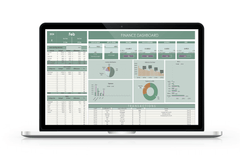Assess Your Finances: Start by understanding your income and expenditures. A simple glance at your bank statements should suffice to get started. For a detailed breakdown, review your receipts for a granular analysis of your spending habits. After all, recognizing and adjusting our spending patterns is key, right? Note down your income sources and all expenses. Organize these expenses into broad categories that make sense to you. For instance, categorize expenses at Apple , McDonald's, and Boots under 'Tech & Internet,' 'Dining Out,' and 'Health & Beauty,' respectively. Continue this exercise until every expense is categorized. This categorization lays the groundwork for your budget.
Set Your Goals: What are your financial aspirations? Saving for a vacation, establishing an emergency fund, or eliminating debt are common goals. Defining clear objectives gives your budgeting efforts a purpose, redirecting funds towards your personal desires rather than letting them slip away unnoticed. If you're curious about the subtle ways your money may be vanishing, consider exploring the article 15 Surprising Ways Your Money Slips Away Without You Knowing.
Choose Your Tool:
- Notebook and Pen: The quintessential method for those who prefer a hands-on approach.
- Printable Budget Template: Ideal for those seeking more structure in their financial planning. A downloadable template can be a great guide. [Free Budget Template]
- Automated Spreadsheet: Best suited for those proficient with Excel, this method facilitates effortless monitoring and analysis of your finances. Automated Budget Template and Finance Tracker
Follow Through:
- Stay Flexible: Adapt your budget to reflect changes in your financial landscape or goals.
- Minimize Debt: Employ effective strategies like the debt snowball or avalanche methods for debt reduction.
- Save Smartly: Focus on accumulating savings for various purposes, such as emergencies or special occasions. Automating your savings can simplify this process.
Celebrate and Learn:
- Celebrate Success: Acknowledge every achievement as you progress towards financial independence.
- Reflect and Adjust: Budgeting is an evolving process. Tailor your approach as you learn what works best for you.
Conclusion: Initiating a budget is the fundamental step towards financial mastery. It’s about making informed choices that guide you to your financial objectives. Whether you opt for a notebook, a printable template, or an automated spreadsheet, the crucial part is to get started. Each step not only involves managing money but also carving a path towards financial success and freedom. This guide aims to inspire and equip you to begin budgeting with confidence. Select the tool that aligns with your preferences and embark on your journey to financial clarity and freedom.
